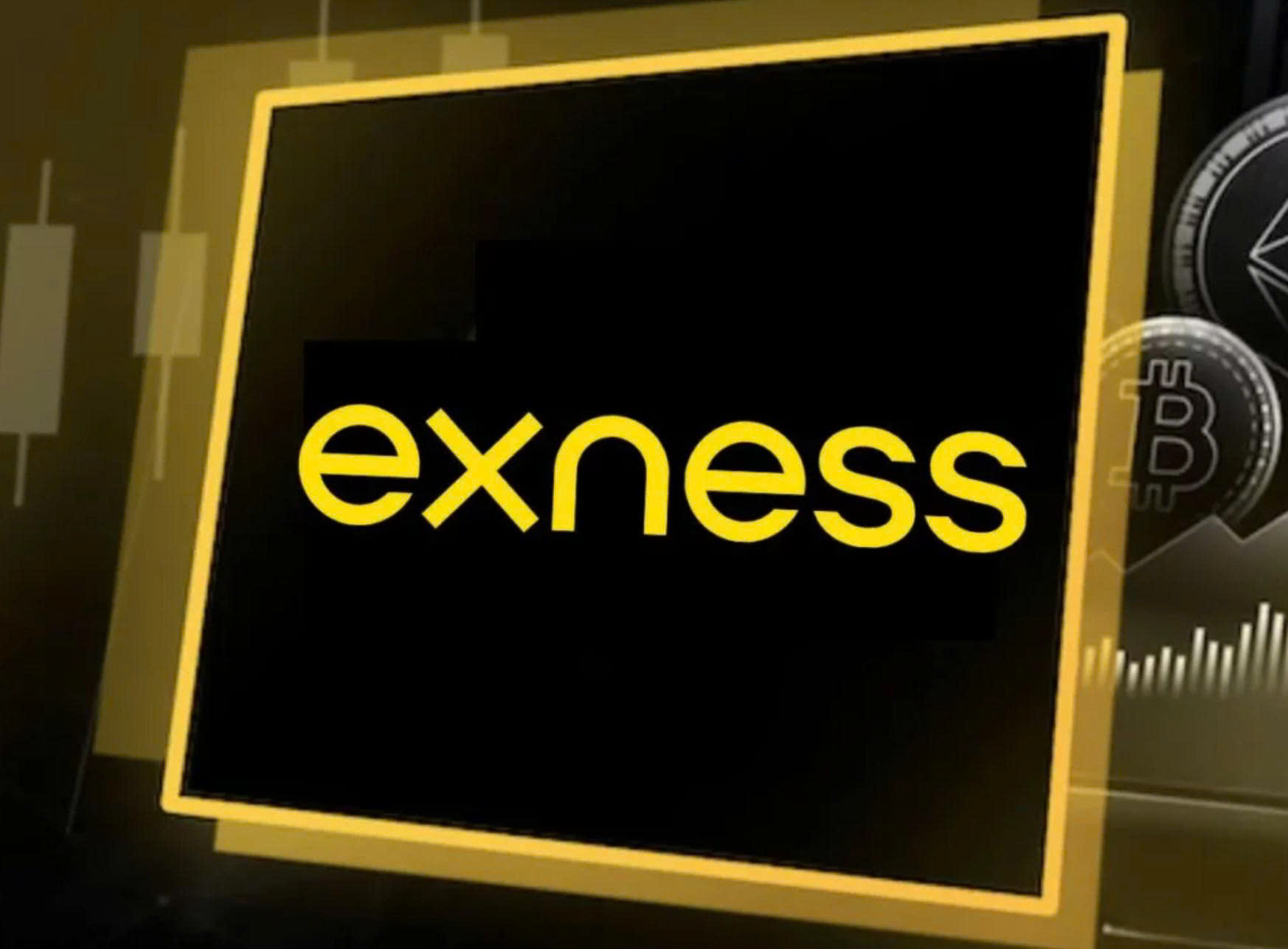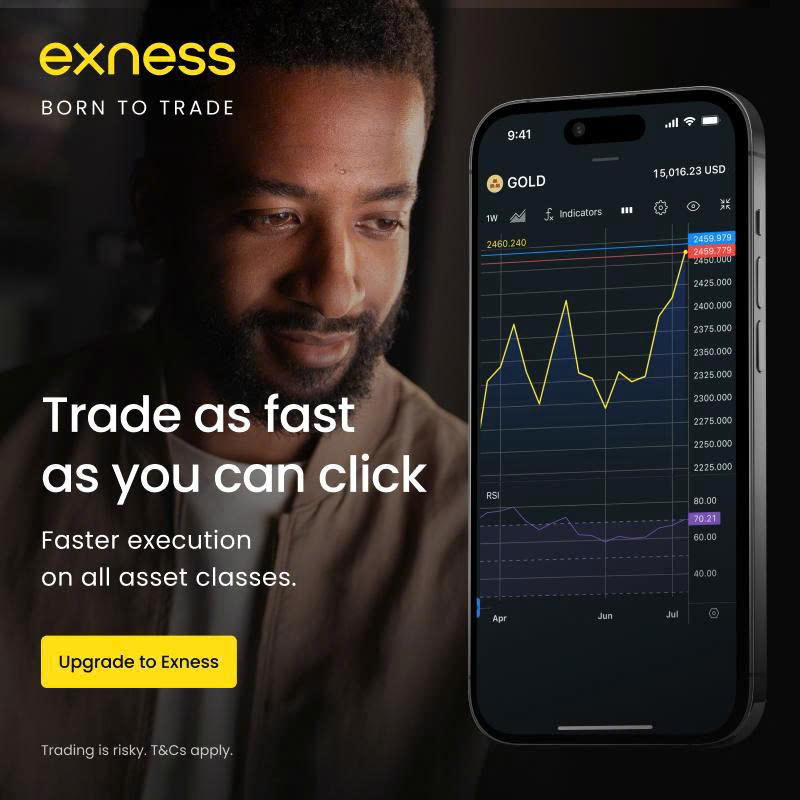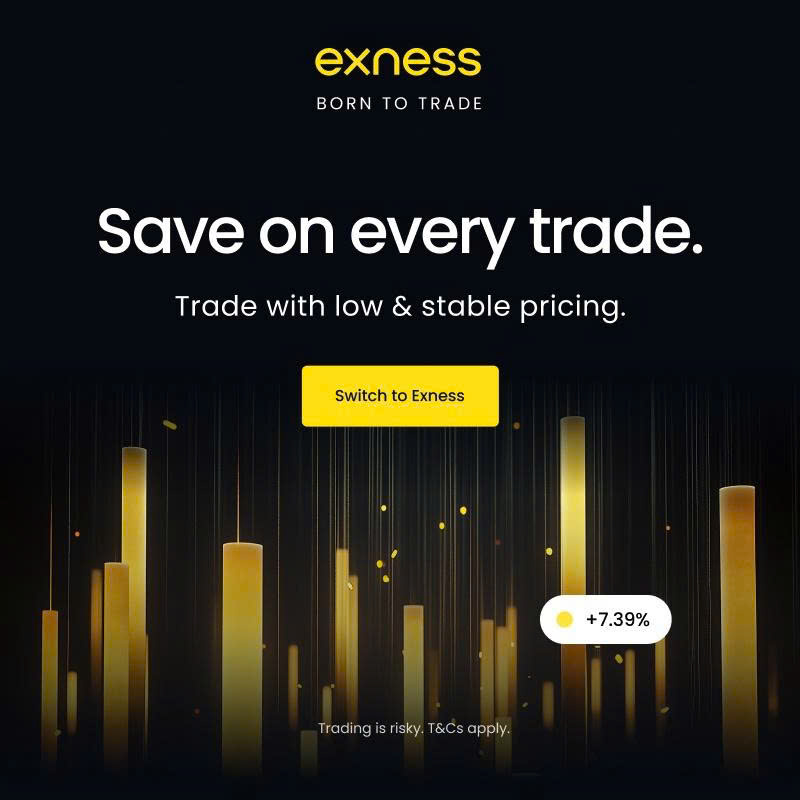
8 minute read
Exness Broker Review in India: Is It the Right Choice for You?
from Exness Review India
If you’re an Indian trader looking for a reliable forex and CFD broker, you’ve likely come across Exness. But is Exness legit, safe, and worth your time in India? In short, Exness is a globally recognized broker with a strong reputation, offering low-cost trading, high leverage, and userfriendly platforms that appeal to both beginners and pros. However, its lack of local regulation in India raises some questions you need to consider. In this Exness broker review for India, I’ll dive straight into its features, pros, cons, and whether it aligns with your trading goals in 2025. Let’s break it down.

✅ Trade with Exness now: Open An Account or Visit Brokers 👈
What Is Exness, and Why Does It Matter for Indian Traders?
Exness, founded in 2008, is a Cyprus-based forex and CFD broker that’s grown into one of the world’s largest, boasting over 1 million active clients and a monthly trading volume exceeding $4 trillion. For Indian traders, Exness stands out because it offers a low entry point (just $10 minimum deposit), tight spreads, and a wide range of assets like forex, cryptocurrencies, commodities, indices, and stocks. It’s also known for its fast withdrawals and robust platforms like MetaTrader 4 (MT4), MetaTrader 5 (MT5), and its proprietary Exness Terminal.
Why does this matter? India’s forex trading scene is booming, with more people diving into global markets. But with strict regulations from the Reserve Bank of India (RBI) and the Securities and Exchange Board of India (SEBI), choosing a broker that balances accessibility, safety, and compliance is crucial. Let’s explore whether Exness fits the bill.
Is Exness Legal and Safe for Indian Traders?
Let’s address the elephant in the room: Is Exness legal in India? The answer isn’t black-and-white. Forex trading in India is legal but heavily regulated. According to the Foreign Exchange Management Act (FEMA), you can only trade INR-based currency pairs (like USD/INR or EUR/INR) through SEBI-regulated brokers or exchanges like the National Stock Exchange (NSE). Exness, however, is an offshore broker, not regulated by SEBI or RBI. Instead, it holds licenses from top-tier global regulators like:
Cyprus Securities and Exchange Commission (CySEC) – License No. 178/12
Financial Conduct Authority (FCA) in the UK
Financial Sector Conduct Authority (FSCA) in South Africa
Financial Services Authority (FSA) in Seychelles
This means Exness operates legally under international standards, but trading non-INR pairs or other assets through Exness falls into a legal gray area in India. Many Indian traders use Exness without issues, but you should consult a financial advisor to ensure you’re compliant with FEMA guidelines.
On the safety front, Exness scores high. It uses segregated accounts to keep your funds separate from company funds, offers negative balance protection (so you can’t lose more than your deposit), and employs SSL encryption to secure your data. These measures, backed by strict oversight from regulators like CySEC and FCA, make Exness a secure choice despite the lack of local regulation.
Key Features of Exness for Indian Traders
Exness offers a range of features that make it appealing for Indian traders. Here’s what you need to know:
1. Low Minimum Deposit
You can start trading with just $10 on Standard and Standard Cent accounts, making it perfect for beginners or those testing the waters. Professional accounts (Pro, Raw Spread, Zero) require a $200 minimum deposit, which is still competitive. This low entry point is a game-changer for Indian traders with limited capital.
2. Tight Spreads and Low Fees
Exness is known for some of the tightest spreads in the industry, especially for forex pairs, gold (XAUUSD), and oil (USOIL). For example, spreads on Standard accounts start at 0.3 pips, while Raw Spread and Zero accounts offer spreads as low as 0.0 pips with a small commission. There are also swap-free accounts for Islamic traders, which is a big plus.
3. High Leverage
Exness offers leverage up to 1:2000, which is among the highest in the market. This lets you control larger positions with less capital, but it’s a double-edged sword—high leverage amplifies both profits and risks. Indian traders must use disciplined risk management to avoid big losses.
4. Wide Range of Assets
With over 100 currency pairs (including majors, minors, and exotics), plus CFDs on cryptocurrencies (Bitcoin, Ethereum), commodities (gold, silver, oil), indices (NASDAQ, FTSE 100), and stocks, Exness gives you plenty of options to diversify your portfolio.

✅ Trade with Exness now: Open An Account or Visit Brokers 👈
5. Fast Withdrawals
Exness processes 98% of withdrawals instantly (within 1 minute), which is a huge advantage. Indian traders can use local payment methods like UPI, bank transfers, credit/debit cards, and e-wallets (Skrill, Neteller) for seamless deposits and withdrawals. However, some users have reported occasional delays, so it’s worth keeping an eye on.
6. User-Friendly Platforms
Exness supports MT4, MT5, and its own Exness Terminal (a browser-based platform) and Exness Trade app. These platforms are intuitive, customizable, and packed with tools like advanced charting, Expert Advisors (EAs), and real-time market data. The mobile app is especially handy for trading on the go.
7. Educational Resources
Exness offers a solid range of educational content, including articles, tutorials, videos, and webinars via its Exness Academy. Topics cover technical analysis, risk management, and even algorithmic trading with Python. While it’s great for beginners, some users feel the content could be more in-depth with interactive webinars.
8. Customer Support
Exness provides 24/7 support in over 14 languages, including Hindi, via live chat, email, and phone. Indian traders generally praise the responsive support, though some have noted delays in resolving complex issues like withdrawals.
Pros and Cons of Exness for Indian Traders
Let’s weigh the good and the bad to give you a clear picture.
Pros
Low-cost trading: Tight spreads, low fees, and swap-free options keep costs down.
Beginner-friendly: $10 minimum deposit and demo accounts make it accessible.
Diverse assets: Over 100 currency pairs, plus cryptocurrencies, commodities, and more.
Fast withdrawals: Most processed instantly, with local payment options like UPI.
Strong regulation: Licensed by CySEC, FCA, FSCA, and others for global credibility.
High leverage: Up to 1:2000, ideal for traders with small accounts (but use cautiously).
Cons
No SEBI/RBI regulation: Offshore status means you must navigate India’s legal gray area.
Occasional withdrawal issues: Some users report delays or technical glitches.
Limited educational depth: More advanced content and interactive webinars would help.
High leverage risks: 1:2000 leverage can lead to significant losses if mismanaged.
How Does Exness Compare to Other Brokers in India?
To see if Exness is the right fit, let’s compare it to local and global competitors:
Local Brokers (e.g., Zerodha, Angel One): SEBI-regulated brokers offer INR-based forex trading but often have higher fees, limited asset classes, and lower leverage. Exness provides more flexibility and global market access, but you lose local regulatory protection.
Global Brokers (e.g., IG, OANDA): These giants offer broader research tools and premium services but often require higher deposits and charge higher fees. Exness stands out for affordability and tight spreads, making it a strong contender for cost-conscious traders.
Exness’s edge lies in its low-cost structure, high leverage, and accessibility, but its offshore status may deter traders prioritizing SEBI regulation.
User Experiences: What Indian Traders Are Saying
Indian traders have mixed but mostly positive feedback about Exness. On platforms like Trustpilot, Exness has a 4-star rating from over 18,000 reviews, with users praising its user-friendly interface, low spreads, and fast withdrawals. One trader noted, “The UI design for web and mobile is smooth, and the commission is fair. I recommend this broker.”
However, some users have faced challenges. For example, a trader reported a delay in a withdrawal of 35,000 INR, claiming Exness provided vague responses. Another mentioned a technical issue where a buy limit order on XAUUSD didn’t execute, resulting in a missed profit opportunity. These complaints are concerning, but Exness’s overall track record suggests these are exceptions rather than the norm.
Tips for Indian Traders Using Exness
If you decide to trade with Exness, here are some practical tips:
Start with a Demo Account: Practice with Exness’s free demo account to get comfortable with the platform before risking real money.
Understand FEMA Rules: Consult a legal or financial advisor to ensure compliance with India’s forex trading regulations.
Use Risk Management: With high leverage like 1:2000, set stop-loss orders and trade small to protect your capital.
Leverage Local Payments: Use UPI or bank transfers for quick deposits and withdrawals.
Explore Educational Resources: Take advantage of Exness Academy to improve your trading skills.
Is Exness the Right Broker for You in 2025?
Exness is a solid choice for Indian traders who value low-cost trading, diverse assets, and user-friendly platforms. Its tight spreads, $10 minimum deposit, and instant withdrawals make it accessible for beginners, while high leverage and professional accounts cater to seasoned traders. The broker’s global regulation (CySEC, FCA, FSCA) adds a layer of trust, but its offshore status means you need to be cautious about India’s legal framework.
If you’re a beginner or a trader with limited capital looking for flexibility and low fees, Exness is worth considering. However, if SEBI regulation is a non-negotiable for you, you might prefer a local broker. Weigh your priorities, do your due diligence, and maybe start with a demo account to test the waters.
✅ Trade with Exness now: Open An Account or Visit Brokers 👈
Read more:

